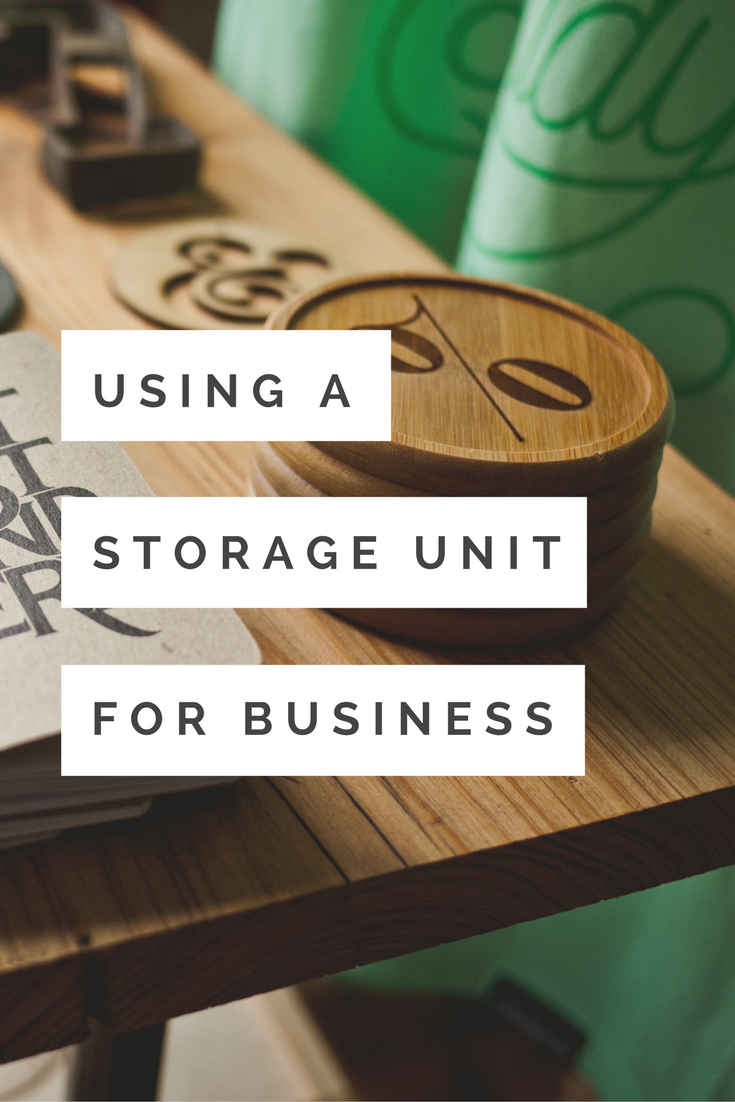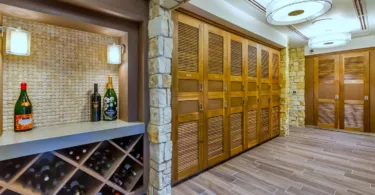Pin for Later:

Are you a small business owner looking to expand into a new space? Maybe you’re an entrepreneur and are finally looking to tackle that business idea you’ve been toying with for ages but need a dedicated place to help you get started.
In situations like these, working out of a storage unit is a no-brainer solution. After all, traditional storage units provide ample space for storage— why not use them for day-to-day business operations, too? Storage units offer an easy way to create a physical separation between work and life. If you’ve been running a business out of your home or garage, you know how challenging that can be.
Even if you’re not a business owner, renting a local storage unit can seem like a great way to set up your very own personal office space. Maybe you live with roommates or are in a co-living situation while you save for a down payment on a house and are having trouble finding a private place in your apartment to set up your desk and work computer. On the other hand, you might live in a studio apartment without an extra bedroom to set up a comfortable home office for your remote day job or even just for your everyday hobbies.
Related: Best Storage Unit Deals and Discounts That Will Save You Money
As the demand for personal workspaces of all kinds continues to rise, it’s no surprise that people are turning to storage units as a creative solution. After all, the rent is cheap, the space is ample, and it’s likely a relatively quiet environment where you can get work done unbothered.
Despite these benefits, there’s much to consider if you’re looking to set-up shop in a storage unit. The first and most important is: Are you legally allowed to work in a storage unit? And if so, in what capacity?
This helpful guide will answer all of your burning questions about working out of a storage unit. Whether you’re a small business owner or a young professional working from home, here’s what you can and can’t do in a storage unit:
Related: Is Living in a Storage Unit Legal?
Can you work in a storage unit?
The short answer is: It depends. Starting up a storage unit workshop, transforming your unit into an office space, and working out of a storage unit in the traditional sense is often not allowed in most cases.
But don’t worry. There are still certain legal ways to run a business out of a storage unit. (We’ll briefly cover commercial storage units later in the guide, or you can jump to that section now for quick access.)
Why can’t you work out of a storage unit?
So what are the ramifications of setting up a business or home office in a storage unit? There are a few reasons why it’s not a great idea to work in your self-storage unit, at least in the traditional sense.
For starters, self-storage units are not zoned for occupancy or business activity of any kind. Of course, this varies by state and by company. But typical storage units often aren’t up to code requirements and the specific standards in place to make workspaces, offices, and workshops comfortable work environments.
And anyways, working out of a storage unit probably wouldn’t be a comfortable experience. Even in a climate-controlled storage unit, the temperature and ventilation systems probably don’t create an ideal environment to work in for hours on end. Renting an affordable climate-controlled storage unit works best for storing documents, furniture, and other household items, but sitting at a desk, filling orders, or creating products inside your storage unit is another story.
Related: Self-Storage FAQs: Renting a Storage Unit
Perhaps most importantly, if you don’t get prior clearance to operate your business out of your storage unit, you risk getting in trouble with your storage provider. Conducting business, taking meetings, or even operating power tools inside your storage unit may violate the terms of your lease, which can leave you at risk of losing your storage space altogether.
As a general rule of thumb, you should expect that anything aside from storage is not allowed without prior permission from your storage unit provider. Check your rental contract or talk to an on-site manager for more information!
Commercial Storage Units
At this point, it’s important to note that there are some legal ways to operate a business out of a storage unit with Life Storage. Some of our locations have designated retail and office space where businesses can operate at full capacity. These spaces offer amenities like restrooms and conference rooms, utilities, parking for tenants and tenant customers, and in some cases, good visibility for a retail business.
You can learn more about these commercial storage spaces, offices, warehouses, and retail spaces for rent with Life Storage and find a unit for rent near you by using our online tool.
How to Operate a Business Out of a Storage Unit: Important Do’s & Don’ts
Let’s say you can only afford a regular storage unit to help grow your business. Here are some general rules to remember and small business inspiration to get your entrepreneurial juices flowing.
Don’ts: Small Business Storage Unit Rules
Commercial storage units have slightly different rules than regular storage units depending on the scale of the business. Remember: Unless you rent an office, retail or commercial space specifically, you’re not allowed to work or conduct business inside a storage unit. Units are not permitted for occupancy, and business activities are usually limited to storage and order fulfillment only.
For a full breakdown of what you can and cannot do within your unit, be sure to refer to your rental contract.
Ask a manager before attempting any of the following business activities inside a standard storage unit:
- Operating machinery, power tools or other equipment.
- Meeting customers and conducting sales out of the unit.
- Installing telephones, computers or other electronics for use inside the unit.
- Adding any additional wiring or outlets beyond what is currently there.
Related: How to Store Furniture in a Garage or Storage Unit the Right Way
Do’s: Creative Ways Small Businesses Can Use Self-Storage
So you may be unable to make your dream of creating a personal office or workshop inside a storage unit a reality. That doesn’t mean that standard self-storage is entirely useless for small business owners, larger companies, and working professionals. Traditional storage units can still help ease some of the burdens of growing operations and the need for additional space. In fact, retail business owners, artisans, and other entrepreneurs can benefit greatly from the extra space a storage unit can provide.
Here are some types of business customers we service here at Life Storage, plus examples of how they use self-storage to enhance their companies:
1. Independent Publishers

Independent publishers and book dealers have many physical products on their hands. After a book or magazine is printed, it ships to a central location before being sent to readers or retailers. So it’s no surprise that there are likely mountains of magazines, pamphlets, brochures, and books required to run a publishing business.
A self-storage unit is a perfect place for a publisher, book dealer, or even a local used bookstore to store inventory and extra supplies like boxes, label printers, and promotional materials. Rather than filling a garage or attic at home with these not-quite-weatherproof products, the company can keep everything in a climate–controlled storage unit to better preserve products in retail condition.
Plus, as the company and its output grow, so can the storage unit. Storage units range in size from tiny to gigantic. Best of all, the publisher can arrange to have their product shipped directly to his storage unit without being present to receive the shipments. When companies opt for our Delivery Acceptance services, the store office retains a key for domestic carriers to open the space and secure shipments inside.
Related: Turning Passion Into A Successful Small Business
2. Local Landscapers or Contractors

If you’re a landscaper or a contractor of any kind, you already know how easy it is to accumulate excessive “stuff” in your line of work. Plus, the clutter doesn’t come with the issue of quantity alone. It’s also bulky and irregularly shaped. Think lawnmowers, leaf blowers, drills, saws, wood, power tools, and more. The space in a truck bed or van is not infinite, so as a landscaper or contractor grows their business, the demand for space will increase too.
Home is not always the right place for a business owner to store everything business-related. Large and clunky items that contractors need may be disruptive to your family, or there might not be enough room to fit it all. In situations like these, a self-storage unit is a great solution. Landscapers and contractors can use storage units to house everything they don’t have room for in the truck or at home.
Most Life Storage facilities offer extended or 24-hour access, or extended access hours so companies that start early or work late will still be able to access the facility grounds and get to their storage unit. Plus, the business owner can set up the unit so that their employees have access. This way, when they have a day off, employees can stop in and grab whatever they need to get their work done. Consider renting a monthly 10×20 storage unit to store landscaping tools, lawn mowers, and small machinery. Contractors may opt for a larger 10×30 storage unit to store equipment and materials for multiple projects.
3. Theaters, Galleries and Artists

Self-storage isn’t something we usually associate with the arts. But think about how much goes into managing a gallery or putting on a show. The artwork alone is no small feat to store. But add in any extra tables, booths, sound equipment, lighting, costumes, and other props needed to put on the show, and it becomes pretty clear that there’s a lot of material involved.
At a small, locally run theater or gallery, space isn’t so easy to come by. So when it comes to finding a safe place to store paintings, set designs, and other elements of past exhibits and productions, self-storage units could be the best place.
On top of the sheer volume of things that require storing, there might also be a need for special storage conditions. Rather than shoving everything into whatever closet space is available, theater and gallery owners can feel better about the condition of their art by storing it in climate–controlled units, which many self-storage facilities like Life Storage offer. These units provide the temperature and humidity required to preserve everything from oil paintings to vintage silk costumes.
Related: Can You Have Band Practice in a Storage Unit?
4. Online Retailers

The idea of crafting for a living is on the rise. Especially with tools like Cricuts and 3D printers being so widely accessible now, starting an Etsy or eBay shop has never been easier. Talented creators may even opt to sell their custom creations directly on social media platforms like Instagram, Facebook, and TikTok. When an online shop finds success, the need for greater available inventory builds. And when the people running these small online businesses produce so much, they need a place to store their inventory.
Though most of these businesses often begin at home in the garage or the craft room, they usually grow out of these spaces. That’s where self-storage can come in handy. A storage unit is a perfect way for this business to keep its inventory safe and sound during production and shipment. That way, they won’t need to crowd their home or workspace with finished products. Storage units can also offer more space to keep inventory organized to more quickly and easily pull and fulfill orders.
Consider storing inventory and packaging materials, in a nearby 10 x 10 storage unit which is big enough space for shelves and storage racks. Larger online retailers may opt for a 10 x 20 unit to accommodate bulk inventory and shipping supplies.
5. Sales and Service Professionals

Working in sales usually means toting around many marketing materials and inventory. For a salesperson who works in one city or one central location, cramming everything in the trunk of their car might work just fine. However, some sales professionals must travel hundreds or thousands of miles to meet with clients. Understandably, that makes carting along all the needed materials cumbersome and time-consuming. Instead, these associates may want to store their business materials in multiple storage facilities closer to their clients.
Likewise, service professionals that provide home repairs, renovations, cleaning, or restocking services benefit from having multiple storage units spread across various locations. Let’s say you own a maintenance company that services apartment complexes across the state. Rather than having the parts you need to complete a repair job in every crew’s van or central location, you can make things easier on your team by dispersing them at different storage facilities. Plus, it can also shorten your response times, which can be crucial in the event of an emergency.
For these businesses, renting a storage unit may be more affordable than finding larger commercial real estate to store more products and supplies. In fact, storage doesn’t need to be a major expense for these businesses. Storage facilities offer spaces as small as a locker that can cost $20 per month or less.
Renting a 5 x 10 storage unit is affordable and ideal for storing sales samples, promotional materials, and portable displays. For reps with larger equipment or product samples, a 10×10 storage unit offers ample space.
Check out our Warehouse Anywhere Services to learn more.
6. Content Creators
From bulky lighting rigs and sound systems to smaller ring lights, promotional materials, and more, a lot goes into creating the entertainment content you consume regularly. That’s why self-storage units can be an invaluable asset for self-employed video producers, designers, and even social media influencers. Instead of finding a place for all of their “behind the scenes” stuff at home, storage units can help store any props that aren’t currently in use.
In a pinch, storage units can also provide a fresh backdrop for photos, videos, and other creative projects. Just be sure to clear it with your rental provider beforehand. Consider renting a small and cheap 5×5 storage unit for storing camera equipment, lighting gear, and props. For content creators with larger equipment or studio setups, a medium size 10×10 storage unit provides additional space for sets and backdrops.
Related: How to Choose a Career You’ll Love
Can a business write off a storage unit?
One perk of renting a storage unit as a business owner: Writing it off on your taxes. If your business requires additional storage space, you can typically write off monthly rental fees as a standard business expense deduction. (The same goes for self-employed contractors.) This doesn’t mean you’ll magically be able to lease a storage unit for free, but it can help you cut costs as a business owner.
Be sure to speak with a tax professional if you have questions about writing off your storage unit as a business owner.
Is Working in a Storage Unit a Good Idea For You?
If there’s anything that should be taken away from this article, self-storage is more versatile than you’d expect. There are many ways to use a self-storage unit to improve and grow your small business. We’ve discussed only a handful of businesses that could benefit from self-storage—we’re sure that there are many more! Let us know how you use self-storage for your small business on social media.
This post originally appeared on the Life Storage blog on 11/3/15 and was revised on 2/15/17 and 12/21/22 to provide new information.







